Ultrasonic cleaners are handy tools. They use sound waves to clean items. But can you use acetone in them? Let’s find out.
What is Acetone?
Acetone is a strong chemical. It is often used as a solvent. People use it to remove nail polish. It can dissolve many things quickly.
What is an Ultrasonic Cleaner?
An ultrasonic cleaner uses sound waves. These waves make small bubbles in the liquid. The bubbles burst and clean the items. It is very effective for cleaning small and detailed items.
Combining Acetone and Ultrasonic Cleaner
Using acetone in an ultrasonic cleaner can be risky. Here are some reasons:
- Flammable: Acetone is very flammable. It can catch fire easily.
- Health Risks: Inhaling acetone fumes can be harmful.
- Damage to Cleaner: Acetone can damage the ultrasonic cleaner parts.
Risks Of Using Acetone In Ultrasonic Cleaners
Let’s look at these risks in more detail:
Flammability
Acetone can ignite quickly. Ultrasonic cleaners generate heat. This heat could start a fire if acetone is used.
Health Risks
Acetone fumes are not safe. Breathing them in can cause headaches. It can also make you feel dizzy or sick.
Damage to the Cleaner
Acetone can harm the cleaner. It might damage plastic parts. This can make your cleaner stop working well.

Credit: tovatech.com
Safer Alternatives to Acetone
There are safer options you can use in your ultrasonic cleaner. Here are a few:
- Water and Dish Soap: A mix of water and dish soap works well. It is safe and effective.
- Isopropyl Alcohol: It is less flammable than acetone. It also evaporates quickly.
- Commercial Ultrasonic Solutions: These are made for ultrasonic cleaners. They are safe and efficient.
Steps to Clean with an Ultrasonic Cleaner
Follow these steps for safe and effective cleaning:
- Fill the cleaner with the right solution. Avoid acetone.
- Place your items in the cleaner.
- Turn on the cleaner. Let it run for the recommended time.
- Remove the items and rinse them with water.
- Dry the items with a soft cloth.
Frequently Asked Questions
Can You Use Acetone In An Ultrasonic Cleaner?
Using acetone in an ultrasonic cleaner is not recommended. It is highly flammable and can cause damage.
What Happens If You Use Acetone In Ultrasonic Cleaner?
Acetone can damage the ultrasonic cleaner. It can also cause safety hazards due to its flammability.
Is Acetone Safe For Cleaning Jewelry?
No, acetone can damage certain jewelry materials. It’s best to use a specialized jewelry cleaner.
Can Acetone Damage The Ultrasonic Cleaner?
Yes, acetone can damage the ultrasonic cleaner’s parts. It is not safe for use in these machines.
Conclusion
Using acetone in an ultrasonic cleaner is not safe. It can cause fires, health problems, and damage your cleaner. Instead, use safer alternatives like water and soap, isopropyl alcohol, or commercial solutions. Follow the right steps to ensure your items are cleaned safely and effectively.

Credit: www.elmaultrasonic.com
Final Thoughts
Always choose safety first. Using the right cleaning solution will protect you and your ultrasonic cleaner. Happy cleaning!














